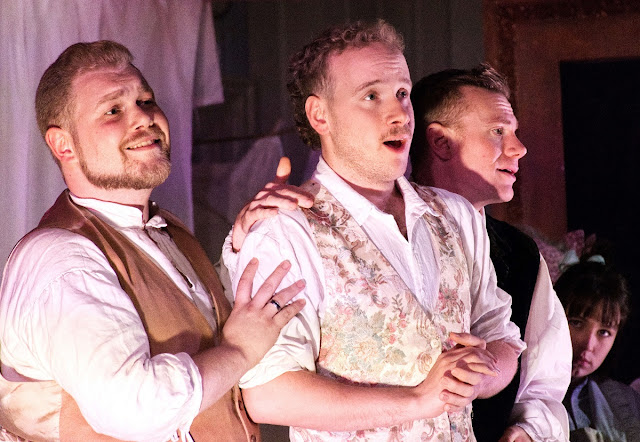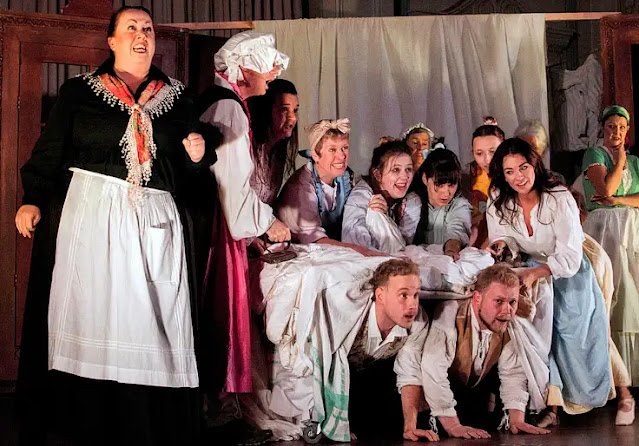 |
| Offenbach: Belle Lurette - Cameron Mitchell, Tristan Stocks, Michael Ferguson, Monica McGhee, Robin Bailey, Kristin Finnigan, Paul Featherstone - New Sussex Opera |
Offenbach: Belle Lurette; Monica McGhee, Kirstin Finigan, Paul Featherstone, Robin Bailey, Files Davies, Michael Ferguson, Cameron Mitchell, Tristan Stocks, director David Foster, St Paul's Sinfonia, conductor Toby Purser; New Sussex Opera at the Bloomsbury Theatre
Reviewed 6 December 2022 (★★★★)
Offenbach's last operetta, incomplete at his death, shows the master still on form in this engaging and stylish revival
In 2021, New Sussex Opera delighted us with a revival of a rare Offenbach operetta, La princesse de Trébizonde [see my review]. And this Autumn the company returned to this territory with the first production in the UK for over 140 years of Offenbach's last operetta. Belle Lurette. Both operettas are in Offenbach's later, more sentimental vein. Following the upsets of the Franco-Prussian War and the Paris Commune, when Offenbach returned to Paris, he largely abandoned satirical operetta for something more sentimental and lyrical. His output included works written for the Opera Comique, and Belle Lurette is in this vein. Unfinished at Offenbach's death, Delibes completed the work and provided the orchestration.
We caught New Sussex Opera's final performance of Offenbach's Belle Lurette at the Bloomsbury Theatre on Tuesday 6 December 2022. Toby Purser conducted St Paul's Sinfonia; the production was directed by David Foster and designed by Victoria Gillians. Monica McGhee was Lurette with Kristin Finnigan as Marceline, Paul Featherstone as Malicorne, Robin Bailey as the Duc de Marly, Giles Davies as Belhomme, Michael Ferguson as Campistrel, Cameron Mitchell as Merluchet and Tristan Stocks as Cigogne. The operetta was sung in a new English version by Paul Featherstone, with a new orchestration by James Widden (leader of the St Paul's Sinfonia).
 |
| Offenbach: Belle Lurette - Cameron Mitchell, Michael Ferguson, Tristan Stocks - New Sussex Opera |
At the time of his death, Offenbach was actually working on three different pieces, Les Contes d'Hoffmann, Belle Lurette and Moucheron. Belle Lurette was largely finished but Delibes had to tidy it up and provide the orchestration. Whereas La princesse de Trébizonde was described as an opéra bouffe, Belle Lurette was an opéra comique, more a sentimental comedy that comic opera. The plot concerns a Parisian laundress, Belle Lurette, and her liaison with an aristocrat, the Duc de Marly. It is a work full of engaging tunes, Offenbach still on great form, but the work is not without problems.
For a start, it is far too long. The performance lasted around 150 minutes with a single interval, Act One was around an hour. Offenbach tended to write too much material, cutting and re-shaping during the rehearsal period. Les contes d'Hoffmann suffers from this problem too; now that all the material has been assembled there is simply too much. Act One of Belle Lurette, set in the laundry, had perhaps at least one too many choruses for the laundresses, delightful though they were. What little plot there is, took a long time to get going. The notional hero of the piece, the Duke, does not appear until Act Two and is absent for most of Act Three. And the setting is very specific, the days around the Feast of Mi-Carême (mid-Lent) which in 19th century Paris was the feast of the laundresses. Act One is thus, in a laundry the day before the feast, whilst Act Three is during the feast itself. Watching the opera, for a contemporary Parisian audience, would be rather different and rather more involving than for later audiences for whom the feast means very little.
The performance was admirably uncut, and the company performed operetta to the manner born but could not quite disguise the limitations. Paul Featherstone's new English translation had its fair share of knowing winks to modern contemporary manners and I was unclear which of the running gags were his and which were in the original. Also, David Foster's production did, at times, rather over-egg things as if he wanted to up the comic quotient in a work that uses it fairly sparingly. Some of this worked wonderfully, Kiera Smitheran's Toinette, a chain-smoking laundress with a series of one-liners, was a complete delight. But the two elderly aristocrats (Giles Davies and Richard Pulham) in the Duke's salon at the opening of Act Two felt grossly overdone.
It helped that the singers had such a stylishly engaging manner with Offenbach, that these limitations were largely overcome.
 |
| Offenbach: Belle Lurette - Robin Bailey - New Sussex Opera |
Monica McGhee made a delightfully feisty Lurette. Her entrance in Act One is very delayed, but once on stage she barely left it, singing with great charm and moving between the sparkling and the sentimental with great ease. She even gave us cartwheels and hand-stands in the last act. Performing this sort of music requires the right combination of personality, musicality and style and McGhee had this in spades. My only complaint is that her diction was rather occluded. Singing operetta means singing the text, and McGhee did not really get it over properly.
Robin Bailey was a charming, if woefully underused hero. His Duke was personable, and Bailey displayed a fine lyric tenor with a lovely sense of line and good words, he even gave the final sentimental duet with McGhee's Lurette just the right feeling.
Kristin Finnigan was Marceline, the older proprietor of the laundry who when younger had an encounter with a nobleman or upper servant whose name she does not know. Finnigan brought great comic charm to the role (which was alarmingly like some of Gilbert's elderly women), including gamely joining Paul Featherstone's Malicorne for a danced duet that sent up Strauss' Blue Danube something rotten.
 |
| Offenbach: Belle Lurette - Kristin Finnigan, Michael Ferguson, Cameron Mitchell, Monica McGhee - New Sussex Opera |
As her ultimate love interest, Paul Featherstone's Malicorne was the prime comic part, complete with a patter song about statistics! Featherstone was a complete exemplar, making the text really count and always musical. Surrounding Lurette was a trio of male admirers, a singer, a poet and a painter, Michael Ferguson, Cameron Mitchell and Tristan Stocks. The running gag being that the singer, Michael Ferguson, almost never gets to sing. The three had great fun, stretching their rather limited roles into something engaging. Unlike Gilbert's operettas, there was no tidying up at the end, no pairing off with a trio of laundresses, which is perhaps a pity. Giles Davies did his best with Belhomme, the captain of the soldiers, one of those annoyingly preening roles that seem to be lifted straight out of Donizetti.
The individual laundresses were nicely done, and there were some strong individual performances so that we had a sense of differentiated characters. Overall, the chorus worked well and managed to fill the stage with colour and movement, even within the relatively limited space.
 |
| Offenbach: Belle Lurette - Giles Davies, Monica McGhee - New Sussex Opera |
In my recent interview with conductor John Andrews, chatting about late Gilbert & Sullivan, we talked about the dilemma between being respectful of a rare work, performing it complete, and being more interventionist and making it work better on stage. This is the problem with Belle Lurette. New Sussex Opera took the admirable decision to perform it uncut and play it straight, thus giving us the best possible experience of the operetta as premiered. But you cannot help feeling that if the work is to be revived, it will need more of a creative hand.
That said, hearing and seeing New Sussex Opera in Offenbach is always a complete delight. They seem to be one of the few companies that can manage to bring this tricky style off. Here we were engaged and dazzled, seduced and amused, with Toby Purser pacing the music superbly and Foster's direction keeping the dialogue zipping along at the right pace. In the pit, the small orchestra (string quintet, single woodwind, horn, trumpet and percussion) played as if to the manner born.
Never miss out on future posts by following us
The blog is free, but I'd be delighted if you were to show your appreciation by buying me a coffee.
Elsewhere on this blog
- Swirling, static energy: Ruthless Jabiru & Decibel New Music Ensemble at Brunel Museum - concert review
- Barely registering on the historical record, Vincente Lusitano's music proves a richly rewarding experience - record review
- Poetry of Paul Laurence Dunbar celebrated at the London Song Festival including songs by Coleridge Taylor, Florence Price, William Grant Still & the premiere of one of my settings - concert review
- From Super Nintendo to a dialogue with Debussy: Swedish composer, Martin Skafte's Preludes - interview
- Riveting showpieces: Benjamin Grosvenor, Philharmonia and Joana Carneiro in Anna Clyne, Chopin and Bartok- concert review
- Wonderfully ambitious: Russell Pascoe's expressive and thoughtful Secular Requiem from Truro Cathedral - record review
- Not so much a history of opera: Simon Banks uses 400 years of opera to hold up a mirror to the attitudes and views of those who watched and commissioned the works - book review
- Barbican Quartet in Haydn, Bartok and Schumann at Conway Hall - concert review
- A hugely ambitious company achievement: Will Todd's Migrations from Welsh National Opera - opera review
- From sets by upcoming British jazz musicians to the outrageously talented finalists of the BBC Young Jazz Musician, a day at the EFG London Jazz Festival - concert review
- I want to live forever: Angeles Blancas Gulin is mesmerising as Emilia Marty in Olivia Fuchs terrific new production of The Makropulos Affair at WNO - opera review
- Finding its true form: Ian Venables' new orchestral version of his Requiem in fine a performance from the choir of Merton College on Delphian - record review
- Home











No comments:
Post a Comment